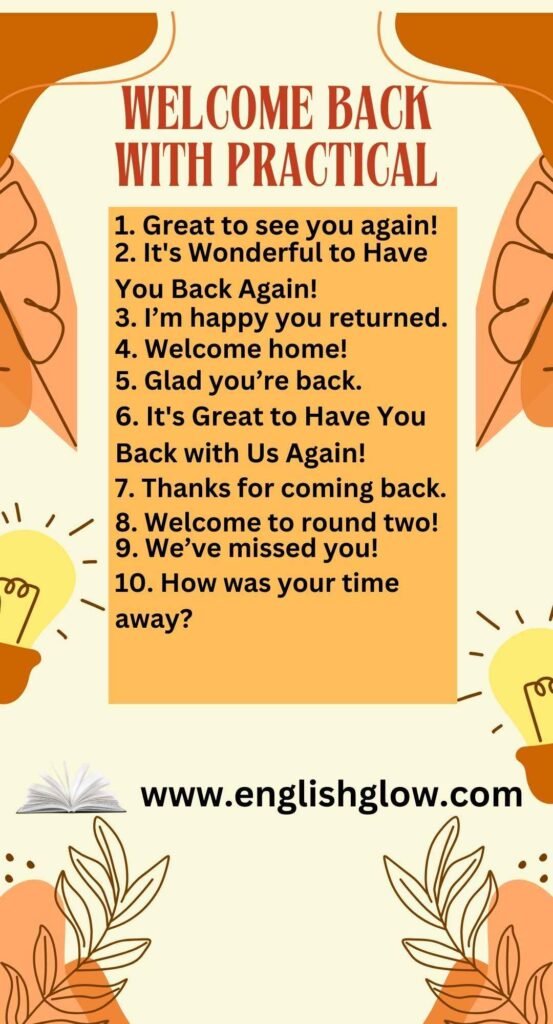Finding the perfect way to greet someone when they return home can make them feel truly loved and appreciated. Instead of using the same standard, classic greeting every time, adding a touch of creativity can go a long way. By switching up your usual “Welcome home” with more personalized phrases, you create a special moment that is more than just words. This blog post will provide examples of unique and thoughtful ways to greet your loved ones, whether it’s after a long day apart or an extended trip.
There are many other ways to make someone feel at home A humorous or lighthearted greeting can brighten the mood, while a sincere message can strengthen the connection.. Imagine the familiar sound of the door opening after a long day, and instead of the usual, you greet them with something like, “I’ve been eagerly awaiting your return! “It’s a personalized and warm greeting that makes them feel valued. These ideas can be used to surprise a family member, roommate, or significant other, adding an extra layer of care and attention to your homecomings.
With these examples, you’ll find ways to express yourself differently and say welcome home in a way that suits your relationship. Whether it’s a playful comment or a deeply emotional note, these alternatives help make homecomings happier and leave a lasting impact on your household. You’ll be confident in testing out these greetings, and they’ll help you find the perfect phrase for every occasion.
Is It Professional to Say “Welcome Back”?
Saying “Welcome Back” is entirely professional in various settings, particularly in the workplace.
Whether an employee is returning from vacation, a leave of absence, or any other situation, using this standard greeting is both appropriate and respectful. In fact, it’s a simple way to make someone feel valued and included when they return. While some may worry it could be unprofessional, as long as it’s delivered sincerely and in a respectful tone, there’s nothing wrong with this friendly greeting in a professional setting.
In most cases, straightforward communication works best in the workplace, and a warm “Welcome Back” is a great way to show that you’re glad someone has returned. It’s important to consider the context, though. A more enthusiastic greeting may not be suitable for a solemn or highly formal occasion, but in most professional circumstances, a cheerful and safe greeting like “Welcome Back” is perfectly acceptable.
As long as the greeting fits the situation, it will always be received well. A warm, professional “Welcome Back” helps set a positive tone and shows that the returning person is appreciated, which is key in fostering a good team environment.
What To Say Instead of “Welcome Back”
Great, see, you, again, nice, have, here, again, happy, returned, welcome, home, glad, back, nice, join, us, again, thanks, coming, back, welcome, round, two, missed, you, time, away.
1. Great to see you again!
Saying, “It’s great to see you again!” is a friendly and warm way to express genuine happiness and excitement about someone’s return.
This phrase is perfect for both casual encounters and more formal settings, making it a very versatile greeting. Whether you’re welcoming a friend back after a trip or greeting a colleague returning from leave, this expression emphasizes the joy and pleasure of reconnecting, while also making a positive impact on the person’s presence. It is suitable for both personal and professional contexts, helping to create a positive and welcoming atmosphere.
For example, You could say, “It’s great to see you again, Emily! Your smile always lights up the room. After a year abroad, we’re excited to hear all about your adventures.”
This type of greeting shows excitement and curiosity about their experiences, making them feel valued and appreciated. In a workplace setting, you could say, “It’s great to see you again! We’ve missed your energy around here and are happy to have you back.”
This is a professional but warm way to welcome someone back, helping them feel reconnected with the team.
You might enjoy reading: 25 Great ways Responses To No Pun Intended – React Fully
2. It’s Wonderful to Have You Back Again!
“So nice to have you here again” is a gentle and heartfelt way to welcome someone back, letting them know their presence is truly valued and appreciated. This phrase conveys warmth and sincerity, making it suitable for a variety of situations, whether in personal gatherings or more professional settings. It is particularly effective when someone’s return has been highly anticipated or long-awaited, helping to convey genuine appreciation for their return.
For example, in a professional setting, you might say, “It’s so nice to have you here again, Mr. Thompson. Your insights have been greatly missed around the office.” This communicates respect and acknowledgment of their contribution. On a more personal note, at a family reunion, you could say, “So nice to have you here again, Aunt June! “The house hasn’t been the same without you!” This adds a sense of warmth and care, making the person feel truly welcomed back.
For example
If a colleague returns from a long business trip, you could say, “It’s so nice to have you here again! The team has really missed your input.” This example shows genuine appreciation and makes the colleague feel that their contributions are valued and important to the group.
3. I’m happy you returned.
Saying “I’m happy you returned” is a straightforward and sincere expression that shows genuine happiness about someone’s return. This phrase can be used in a wide range of situations, from casual to formal, and it communicates the speaker’s positive feelings in a clear way. It is especially effective when you want to express personal relief or when someone’s absence has had a significant impact. Whether in close relationships or professional settings, this phrase makes the person feel valued and appreciated.
For instance, you could say, “I’m so glad you made it back safely from your trip, Sarah!” We’ve all missed you around here—it’s been so quiet without you.” This example conveys both relief and warmth, letting Sarah know she was missed and that her presence makes a difference. In a more casual setting, you could say to a friend, “Happy you returned! “Things just haven’t been the same without you.” This phrase helps the person feel valued and appreciated.
4. Welcome home!
Saying “Welcome home!” is a heartfelt and emotionally meaningful expression that conveys warmth, belonging, and comfort. It’s often reserved for someone who is returning to a place they consider their home, whether it’s after a long trip or after being away for a significant period of time. This phrase emphasizes that the person’s presence is an integral part of the family or community they’ve returned to. It’s especially powerful during emotional reunions, such as when a family member comes back from a long journey or a service member is finally coming back to their loved ones.
For instance, you might say, “The moment she walked through the door, her family cheered, ‘Welcome home! We’ve missed you so much!’” This conveys the emotional warmth and happiness of the moment. Another example could be a community gathering with a banner that reads, “Welcome home, Sgt. Martinez!” celebrating a hero’s return after a long time in service. These examples highlight how impactful this phrase can be in reunions filled with love and connection.
You might enjoy reading: Unique Phrases to Replace Don’t Threaten Me With A Good Time
5. Glad you’re back.
Saying “Glad you’re back” is a concise and heartfelt way to express happiness about someone’s return. This versatile phrase works in both formal and informal contexts, making it suitable for use with friends, families, and even in professional environments. It’s an expression that conveys not only relief but also satisfaction that the person has returned. Whether it’s at the office after a business trip or at home after a long absence, this phrase implies that the person’s absence was felt and their return is seen as a positive development.
For example, you could say to a coworker, “It’s great to have you back! Things just haven’t been the same without you around.” This not only shows appreciation for their presence but also acknowledges their contribution to the team. In a more personal setting, you could say, “Glad you’re back! The house felt a little empty without you.” Both examples show how this phrase can be used to create a warm and welcoming atmosphere.
Here’s another example: When a friend returns from a trip, you might say, “It’s great to have you back!” We missed you at our weekly meetups; it wasn’t the same without you.” This simple expression highlights how their absence was felt and shows your happiness about their return.
6. It’s Great to Have You Back with Us Again!
Saying “Nice of you to join us again” is a formal and polite way to acknowledge someone’s return in a welcoming manner. This phrase can subtly imply that the person’s presence is appreciated and seen as beneficial to the group or situation. It’s an expression that works well in professional meetings, academic settings, and even more formal social gatherings. The phrase highlights that their reappearance is noteworthy and adds value to the group dynamic.
For example, during a team meeting, you could say, “Nice of you to join us again, Mr. Lee. Your insights are always so helpful.” This acknowledges the person’s return in a welcoming way while recognizing their contributions. In a more casual context, like a book club, you might hear, “Nice of you to join us again! We missed your thoughtful input last week.” Both examples show how this expression can create a positive and polite atmosphere
Here’s another example: In a classroom setting, the teacher might say, “Nice of you to join us again, Emily. Your contributions always spark great discussions.” This not only acknowledges her return in a polite and formal tone but also emphasizes how her presence is appreciated and beneficial to the group.
7. Thanks for coming back.
Saying “Thank you for coming back” is a polite and appreciative way to acknowledge someone’s return.
It highlights the speaker’s gratitude and can be used in situations where the person’s return is beneficial, desired, and valued. Whether it’s a team member returning to work or a friend rejoining a social circle, this phrase conveys thankfulness for the person’s decision to return and the positive impact their presence brings.
For example, you might say to a colleague, “Thanks for coming back! Your expertise is truly needed as we face this new challenge together.” This not only shows appreciation but also emphasizes the value of their presence in the team. In a different setting, such as a performance group, the director could say, “Thanks for coming back to help us with this event. Your talent really shines on stage.” Both examples highlight how this phrase can be used to acknowledge someone’s return and their positive contributions.
Here’s another example: Imagine a friend rejoining your study group after a break. You could say, “Thanks for coming back! We really missed your insights, and your ideas always help us move forward.” This shows your gratitude for their return and emphasizes the positive impact they have on the group.
8. Welcome to round two!
Saying “Welcome to round two!” is a fun and energetic way to acknowledge a situation where there’s a sense of continuation or renewed effort. This phrase suggests that the person’s return marks the beginning of a new phase or challenge, adding a feeling of excitement and anticipation to the situation. It’s particularly appropriate in competitive or creative environments, such as when a team is starting a new project or someone is coming back after a break to tackle something fresh.
For example, at the start of a new semester, a teacher might greet the class with, “Welcome to round two! Let’s make this semester even better than the first.” This not only sets a positive tone but also encourages the students to look forward to the next phase. In a work setting, a team leader could say, “Welcome to round two, everyone! Now let’s build on our success and push this project to the next level.” Both examples show how this phrase brings excitement and energy to the idea of starting again with renewed effort.
9. We’ve missed you!
Saying “We’ve missed you!” is a warm and inclusive way to convey that someone’s absence was noticed and that their return brings happiness and a sense of wholeness.
This phrase is perfect for close-knit groups like families, teams, or friends, as it conveys a strong sense of community and emotional connection. It highlights the importance of the individual and the influence their presence has on the group.
Using this phrase shows the person that their return is not just noticed but deeply appreciated.
For example, at a family gathering, you might hear everyone say, “We’ve missed you! It hasn’t been the same without you at our dinners.” This creates a warm, welcoming atmosphere, highlighting how important the person is to the group. In a work setting, a sports team could say, “We’ve missed you on the field; your spirit drives us forward.” Both examples show how this phrase helps reinforce the sense of unity and the importance of the individual’s role within the group.
Here’s another example: Imagine a group of friends reuniting after one has been away for a while. They might say, “We’ve missed you! Our hangouts just weren’t the same without your laughter and energy.” This shows the emotional connection within the group and how the person’s presence truly impacts their time together.
10. How was your time away?
Saying, “How was your time away?” is a considerate and inviting way to greet someone upon their return. This phrase shows genuine interest in their experiences during their absence and invites them to share stories and insights. It fosters a sense of connection and understanding, making the person feel valued. Whether in a personal or professional context, this expression works well, especially when someone has been away for a significant period or for an important reason.
For example, when your roommate returns after a long trip, you might say, “How was your time away?”I’m looking forward to hearing all about it.” This demonstrates that you care about their experiences and want to reconnect.
In a work setting, you could say to a colleague, “How was your time away? I’m sure you’ve come back with new ideas and fresh perspectives!” This provides an opportunity for conversation and demonstrates that you appreciate their insights.
example
Here’s another example: After a friend returns from a vacation, you could ask, “How was your time away?“I can’t wait to hear about all the fun things you did!” This expresses your interest in their trip and encourages a deeper connection by inviting them to share their experiences with you.
You might enjoy reading:25 Other ways to say let me know if you need anything






